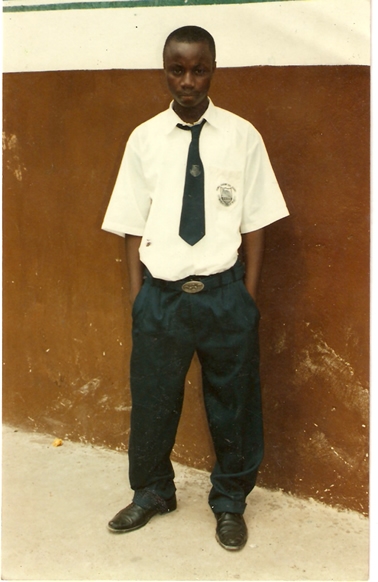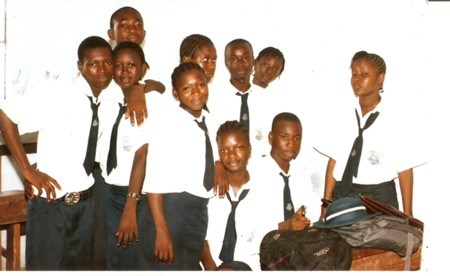 |
| Mohamed Sidibay in Sierra Leone |
In 1997, at the age of five, Mohamed Sidibay experienced a defining moment in his life. Civil war had already broke out in his homeland of Sierra Leone, bringing with it an air of unease that pervaded his community. Yet in this single moment, the conflict erupted from the background into the center of Mohamed's life. Rebel soldiers broke into his home and murdered his family. The soldiers then abducted Mohamed, the sole survivor of his family. They brought him to their camp and gave him a gun. He was told that if he did not fight in this army, he would be killed. Mohamed was put to work as a child soldier in service of the Revolutionary United Front (RUF). He remained under their control for almost five years.
By the time the war ended, when Mohamed was finally released from the RUF, Sierra Leone was bitterly poor. He and scores of other child soldiers were left homeless. Rescued by an Italian Priest, Mohamed went through the UN DDR programme. With the help of UNICEF, Mohamed was enrolled in school at age 10.
Through another youth, Mohamed was introduced to Andrew Greene. Andrew was the then country director for iEARN (International Education and Resources Network), a nonprofit that connects students and educators from all over the world through technology. It was through iEARN that Mohamed began to study in earnest. His talents were recognized by Canadian educators Anita Townsend and Mali Bickley. Their students at the W.H. Day Elementary School began to exchange messages with Mohamed, and quickly started to raise money so that he could cover expenses not covered by UNICEF.
At the age of 10, a documentary was made about the life of Mohamed after the war. A documentary that went on to win the George Foster Peabody Award.
 |
| Mohamed Sidibay, at school with friends |
In addition to his academic work, Mohamed devotes his time to playing soccer and reading poetry. He also volunteers as a youth reporter for the MY HERO Project, creating videos about inspiring individuals such as Rashid Peters, a socially conscious musician. Mohamed’s current plans are to go to college and study international relations, followed by law school. He wants to work with organizations such as the United Nations, to prevent international conflicts and make sure that no other children are forced to become soldiers, as he was.
Though he now spends his time commemorating heroes of his own, Mohamed himself remains a great hero to many of the people in his life: his friends, teachers, fellow students and the people around the world who have been inspired by his journey. Mohamed Sidibay began his life in a state of horror, and emerged with nothing but the clothes on his back and a will to move forward. The fact that he has achieved so much since then is a stirring testament, both to Mohamed's character and to the many people who helped him along the way. His experience stands as a crushing rebuke to the notion that some lives are beyond hope, demonstrating that with enough determination, and the help of caring individuals, even the worst existence can be transformed into one of the brightest.
Page created on 3/1/2015 1:39:26 PM
Last edited 5/27/2018 1:59:48 PM
